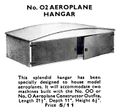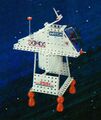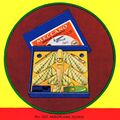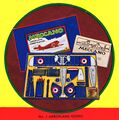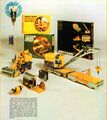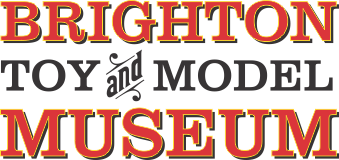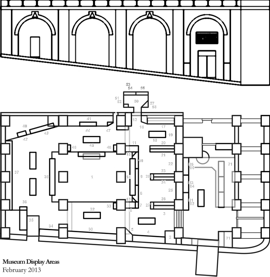Category:Meccano
| Toy Brands and Manufacturers |
|---|
Meccano |
Meccano is a famous metal construction toy designed by Frank Hornby, that allows models to be built from perforated metal plates and strips, in conjunction with nuts, bolts, rods and wheels.
Hornby's original patent for the system that became Meccano was granted in 1901, and after starting out as a business with one employee, operating out of one room (and with the less-than-catchy name "mechanics made simple"), Hornby's product finally got going with the help of a recommendation from a professor of engineering () and a new name and commissioned logo, and Meccano Ltd. started as a limited company in 1908.
Although an early set designed by Hornby for the educational market described Meccano as having metric measurements, the finalised system used imperial measurements and was based on half-inch-wide strips with half-inch hole spacings (with holes designed to take rods and screws of ~3/16 of an inch diameter).
Design
Meccano's success was partly down to its' stylised simplicity and its strong design statement. The strips didn't pretend to correspond to anything that existed in the "real world" of engineering, and (unlike the drawings in the patent application) had distrinctive rounded ends that eliminated sharp corners and allowed strip ends to be bolted together at any angle and still show a "flush" fit.
The strong emphasis on "prototypic" geometrical shapes mean tthat while Meccano sets often included specialised types of cogs and other fundamental mechanical components (such as bevel gears and worm gears) that had a strict functional purpose, Meccano resisted the temptation to make specialised parts solely for cosmetic reasons (outside very specialised sets, such as the airplane sets). Occasionally one could find specialised dedicated parts such as train buffers, but in general Meccano stayed fairly true to the idea that if you wanted a specific shape, you had to build it yourself.
Meccano spawned a lot of imitators, but it's geometrical simplicity made it difficult to copy the basic idea without also copying the basic shapes, resulting in a product that looked like a cheap copy of Meccano ... which then further increased Meccano's reputation as the product that other people were tryng to emulate.
Branding
Meccano Ltd. and the Binns Road factory went on to produce a number of other key brands, notably Hornby Trains and Dinky Toys, but these toys often also included the Meccano name, and sometimes had other references to the Meccano parent brand, such as the Hornby Trains gauge 0 lattice footbridge, which was clearly made to match and reference the lattice plates in Meccano sets.
Promotion
Meccano Ltd didn't seem to miss a trick when it came to promotion and developing brand loyalty, and the company experimented with a range of publications that promoted the Hornby and Meccano names, the most successful being Meccano Magazine, which carried serious articles on engineering news and (engineering-related) current affairs.
External links
- Meccano databases (nzmeccano.com)
- Meccanoscene (meccanoscene.co.uk)
- Directory of Meccano Clubs and Correspondents (internationalmeccanomen.org.uk)
- Tim Robinson's Meccano Computing Machinery website: Bibliography (meccano.us) - Building computers out of Meccano
- Shirley Dent, the Meccano Man] - profile of Harry Kroto, co-discoverer of Carbon 60 "Buckminsterfullerine", describing how he was influenced by Meccano as a child.
Subcategories
This category has the following 54 subcategories, out of 54 total.
1
- 1910s Meccano (1 P, 1 F)
- 1920s Meccano (3 P, 5 F)
- 1940s Meccano (2 F)
- 1950s Meccano (22 F)
B
- Binns Road (2 F)
C
- Meccano cranes (4 P, 18 F)
E
- Elektrikit (1 P, 9 F)
F
- French Meccano (1 P, 9 F)
G
M
- Meccano (brand) (empty)
- Meccano Aerodrome (6 F)
- Meccano Aeroplane Constructor (6 P, 36 F)
- Meccano clockwork motors (6 P, 7 F)
- Meccano electric motors (4 P, 5 F)
- Meccano Evolution (2 P, 11 F)
- Meccano Mechanised Army (1 P, 6 F)
- Meccano Motor Car Constructor (8 P, 42 F)
- Meccano Motor Car Constructor No1 Outfits (1 P, 10 F)
- Meccano Motor Car Constructor No2 Outfits (1 P, 12 F)
- Meccano Multikits (4 P, 37 F)
- Meccano official retailer and exhibition models (7 P, 23 F)
- Meccano Parts (52 F)
- Meccano Space (3 P, 12 F)
- Meccano steam engines (4 P, 9 F)
- Meccano Super Models (1 P, 2 F)
- Meccano X Series (3 P, 13 F)
- Mechanics Made Easy (5 P, 10 F)
- Metal Construction Sets (display) (42 P, 14 F)
- Mogul Steel Toys (2 P, 14 F)
P
- Plastic Meccano (3 F)
- Pocket Meccano (2 F)
- Prima (3 F)
T
- Themed Meccano sets (2 P)
Pages in category ‘Meccano’
The following 80 pages are in this category, out of 80 total.
E
M
- Meccano Accessory Outfit 00A
- Meccano Accessory Outfit 3a
- Meccano Aero Clockwork Motor No2 (Meccano M231)
- Meccano Aeroplane Constructor Outfit (No2 Special)
- Meccano Army
- Meccano Chinese Lantern, exhibition model (~1928)
- Meccano Clockwork Motor
- Meccano Clockwork Motor No1
- Meccano Clockwork Motor No1A
- Meccano Clockwork Motor No2, black, 1912 (Märklin for Meccano Ltd)
- Meccano Clockwork Motor No2, silver, 1912 (Märklin for Meccano Ltd)
- Meccano clones
- Meccano Electric Motor E020
- Meccano Electric Motor E20R(S)
- Meccano Electrical Outfit
- Meccano Evolution 8200 Crane Truck
- Meccano Evolution 8200 Crane Truck, assembly notes
- Meccano fairground traction engine (retailer promotional model)
- Meccano Ferris wheel
- Meccano Ferris wheel, small
- Meccano Gears Set
- Meccano Giant Block-Setting Crane (Meccano Super Models No 4)
- Meccano illuminated shop display sign
- Meccano miniature model steamroller
- Meccano Motor Car Constructor Accessory Pack 4
- Meccano Motor Car Constructor Outfit No1
- Meccano Outfit 000, special parts
- Meccano Parts and How to Use Them (Meccano Ltd)
- Meccano Saw Bench
- Meccano Set (unidentified)
- Meccano Highway Vehicles Set (Set 3)
- Meccano Set 6 - L'Equipment Portuaire (Port Equipment) set
- Meccano Set No 10
- Meccano Shafting Standards display
- Meccano six-speed electric motor 228
- Meccano Space 2501 outfit
- Meccano Standard Mechanisms (Meccano Ltd)
- Meccano Standard Mechanisms, US edition (Meccano Ltd)
- Meccano Steam Engine (Mamod for Meccano)
- Meccano Steam Engine, 1929 (Meccano Ltd)
- Meccano Steam Engine, 1935 (Meccano Ltd)
- Meccano steamroller, blue and gold
- Meccano Stephenson's Rocket (retailer promotional model)
- Meccano twelve-wheeler mobile telescopic crane (retailer promotional model)
- Meccano Upright Steam Engine, 1914 (Bing for Meccano Ltd)
- Meccano windmill (retailer promotional model)
- Mechanics Made Easy - Meccano, dual-branded tinplate sign
- Mechanics Made Easy, Outfit 1A (Elliott and Hornby)
- Mechanics Made Easy, set (Elliott and Hornby)
- Mechanics Made Easy, Set B (Elliott and Hornby)
- Mobile Anti-Aircraft Gun (Meccano Mechanised Army)
- Mogul Dump Truck 3201 (Meccano)
- Mogul Fire-Fighter (Meccano)
S
T
- Tank Transporter (Meccano Multikit)
- The British Model Builder, Outfit No.1
- The Evolution of Meccano
- The Hornby Trains prototype
- The Meccano Book of Engineering
- The Progress of Meccano (MBoNM 1930)
- Three-engined Biplane Transatlantic Airliner (Meccano Aeroplane Constructor)
- Tower Crane (Meccano Multikit)
- Two-seater French monoplane (Meccano Aeroplane Constructor)
- Two-Seater Sports Car (Meccano Motor Car Constructor)
Media in category ‘Meccano’
The following 200 files are in this category, out of 380 total.
(previous page) (next page)- 00-4 Models on Pegboard, Meccano Display Model 57-4 (MDM 1957).jpg 3,852 × 1,725; 1.03 MB
- A New Meccano Outfit, 000 (MM 1930-10).jpg 2,333 × 3,000; 1.34 MB
- Aeroplane Hanger No02, Meccano Aeroplane Constructor (MM 1936-01).jpg 1,310 × 1,220; 222 KB
- Anti-Aircraft Gun, Meccano Multikit (MCMBM 1975).jpg 3,000 × 2,122; 4.1 MB
- Army and Combat Meccano Multikits, boxes (MCMBM 1975).jpg 1,600 × 948; 1 MB
- Army and Combat Meccano Multikits, examples (MCMBM 1975).jpg 2,000 × 1,310; 1.09 MB
- Army Set models, Meccano (MBoM4 1978).jpg 1,200 × 834; 882 KB
- Big Wheel, Meccano Display Model 57-11 (MDM 1957).jpg 1,992 × 2,700; 730 KB
- Biplane, Meccano X Series.jpg 4,000 × 2,676; 1.95 MB
- Biplane, No0 Aeroplane Outfit (1939 catalogue).jpg 560 × 364; 30 KB
- Breakdown Recovery Truck (MCMBM 1975).jpg 3,000 × 2,122; 4.27 MB
- Building your own motor cars, p776 (MM 1932-10).jpg 1,204 × 1,617; 490 KB
- Building your own motor cars, p777 (MM 1932-10).jpg 1,605 × 2,156; 690 KB
- Cattle Truck, Meccano Multikit (MHMBM 1975).jpg 3,000 × 2,122; 3.49 MB
- Cement Truck, Meccano Multikit (MHMBM 1975).jpg 3,000 × 2,122; 3.89 MB
- Chinese Lantern, Meccano Ltd - Hornby Trains, detail.jpg 2,800 × 1,867; 2.5 MB
- Colouring-in sheet - Meccano Car.jpg 3,508 × 2,482; 889 KB
- Combat Set models, Meccano (MBoM4 1978).jpg 1,200 × 844; 888 KB
- Combat, Crane, Highway and Army Sets, Meccano (MBoM4 1978).jpg 3,000 × 1,819; 2.65 MB
- Contents of Meccano Elektrikit (BEM 1963).jpg 1,600 × 1,309; 337 KB
- Cosmic Pirate, spaceship (MSBoM 1979).jpg 1,600 × 746; 364 KB
- Crane Set models, Meccano (MBoM4 1978).jpg 1,200 × 843; 858 KB
- Crane-building Set, Meccano Multikit (DinkyCat12 1976).jpg 2,200 × 1,660; 887 KB
- Diesel Electric Locomotive, Meccano Display Model 57-15 (MDM 1957).jpg 2,893 × 1,988; 706 KB
- Double Arm Signal (Meccano X Series).jpg 1,166 × 2,198; 255 KB
- E2 and E3 switches, Meccano Elektrikit (BEM 1963).jpg 2,500 × 2,038; 614 KB
- E27 and E28 Voltmeters, Meccano Elektrikit (BEM 1963).jpg 2,500 × 2,048; 999 KB
- E34 Complete Morse Telegraph, Meccano Elektrikit (BEM 1963).jpg 2,500 × 2,041; 993 KB
- Early Meccano steam engine, detail.jpg 931 × 1,200; 328 KB
- Early Meccano steam engine.jpg 904 × 1,200; 92 KB
- Electrikit (MCat ~1963).jpg 1,200 × 840; 224 KB
- Electrikit logo.jpg 1,600 × 563; 121 KB
- Extending Tower Truck, Meccano Multikit (MHMBM 1975).jpg 3,000 × 2,122; 3.56 MB
- Federation Protector spaceship, and Blast Deflector (MSBoM 1979).jpg 1,600 × 607; 323 KB
- Ferry Gangway (Meccano X Series).jpg 1,469 × 1,376; 203 KB
- Flying Jet Planes, Meccano Display Model 57-12 (MDM 1957).jpg 2,095 × 2,573; 640 KB
- Frontier Checkpoint, Meccano Multikit (MCMBM 1975).jpg 3,000 × 2,122; 3.52 MB
- Galaxy Seeker, spaceship (MSBoM 1979).jpg 1,600 × 621; 311 KB
- Gamleys-branded Meccano Ltd catalogue, cover (1927).jpg 2,022 × 3,000; 3.76 MB
- Gears B Mechanisms on Pegboard, Meccano Display Model 57-2 (MDM 1957).jpg 3,857 × 1,727; 1.01 MB
- Glider (Meccano X Series).jpg 1,201 × 820; 110 KB
- Grand Prix Special (Meccano Motor Car Constructor 2).jpg 2,556 × 1,077; 375 KB
- Green clockwork Tourer (Meccano Motor Car Constructor 2).jpg 3,000 × 1,200; 430 KB
- Ground Base, space station (MSBoM 1979).jpg 1,600 × 1,383; 633 KB
- Halfords full-page advert (MM 1933-07).jpg 1,512 × 2,000; 523 KB
- Hand Car (Meccano X Series).jpg 1,280 × 1,249; 194 KB
- Harbutt's Plasticine, Meccano (MM 1938-11).jpg 577 × 1,470; 227 KB
- Helicopter, Meccano Display Model 57-1 (MDM 1957).jpg 2,171 × 2,187; 631 KB
- Helicopter, Meccano Multikit (MCMBM 1975).jpg 3,000 × 2,122; 3.91 MB
- High Wing Airliner, No2 Special Aeroplane Outfit (1935 BHTMP).jpg 772 × 548; 59 KB
- High Wing Monoplane, No0 Aeroplane Outfit (1935 BHTMP).jpg 837 × 561; 55 KB
- High Wing Monoplane, No0 Aeroplane Outfit (1939 catalogue).jpg 711 × 375; 31 KB
- Highway and Super Highway Meccano Multikits, boxes (MCMBM 1975).jpg 1,600 × 1,064; 986 KB
- Highway Set models, Meccano (MBoM4 1978).jpg 1,200 × 834; 839 KB
- Hornby Trains, original Meccano prototype.jpg 640 × 680; 138 KB
- How To Use The Meccano Steam Engine, front cover.jpg 2,500 × 1,670; 1.47 MB
- Intergalactic Stingray and Space Wasp, spaceships (MSBoM 1979).jpg 1,600 × 867; 397 KB
- Jaeger Meccano Jersey (MM 1924-011).jpg 2,000 × 1,298; 496 KB
- James Mays Toy Stories, cover and spine (ISBN 9781844861071).jpg 1,451 × 1,600; 1.39 MB
- Jumbo Crane, Meccano Multikit (MHMBM 1975).jpg 3,000 × 2,122; 3.31 MB
- Jumping Jack (Meccano X Series).jpg 857 × 1,915; 124 KB
- Jupiter Tri-ship and Mercurian Invader, spaceships (MSBoM 1979).jpg 1,600 × 851; 437 KB
- Landing Module, spaceship (MSBoM 1979).jpg 1,347 × 1,600; 616 KB
- Light Biplane, No1 Special Aeroplane Outfit (1939 catalogue).jpg 615 × 360; 34 KB
- Light Six Speed Car (Meccano Motor Car Constructor 2).jpg 2,556 × 1,065; 338 KB
- Light Sports Two-Seater (Meccano Motor Car Constructor 2).jpg 2,556 × 1,065; 394 KB
- Mamod and Meccano (MM 1960-03).jpg 1,610 × 2,200; 1.04 MB
- Mamod fits your Meccano, SE4 (MM 1938-11).jpg 2,341 × 2,989; 804 KB
- Manual front cover, French Meccano set 1 (MeccanoSetFr1 1967).jpg 2,400 × 1,542; 705 KB
- Manual front cover, French Meccano sets 2 3 (MeccanoSetFr2-3 1967).jpg 2,400 × 1,550; 719 KB
- Martian Marauder, spaceship (MSBoM 1979).jpg 1,600 × 1,107; 494 KB
- Meccano 'Magic Motor' (1935 BHTMP).jpg 604 × 668; 59 KB
- Meccano - Dad with pipe (MM 1963-10).jpg 1,472 × 1,869; 367 KB
- Meccano - Mechanics Made Easy, metal sign.jpg 180 × 94; 16 KB
- Meccano 1920s artwork, The Worlds Mechanical Wonders in Every Home.jpg 2,000 × 1,334; 747 KB
- Meccano 1937 double-page (MM 1937-09).jpg 2,451 × 1,623; 800 KB
- Meccano Accessories (DinkyCat12 1976).jpg 1,400 × 885; 277 KB
- Meccano Accessory Outfits MBE ad 1931.jpg 949 × 964; 187 KB
- Meccano ad - The thrill of Build it Yourself (MM 1957-12).jpg 1,009 × 1,477; 218 KB
- Meccano advert - it's real, it works (MM 1961-06).jpg 4,203 × 2,559; 907 KB
- Meccano Aero Clockwork Motors (1939 catalogue).jpg 899 × 479; 120 KB
- Meccano aerodrome graphic ((MM 1935-08).jpg 2,815 × 635; 195 KB
- Meccano Aerodrome, wide view (MM 1934-07).jpg 3,000 × 1,080; 980 KB
- Meccano Aerodrome. closeup (MM 1934-07).jpg 3,000 × 1,838; 1.22 MB
- Meccano Aeroplane Construction Outfits, camouflage (MM 1940-07).jpg 3,000 × 1,911; 821 KB
- Meccano Aeroplane Constructor (MM 1935-06).jpg 1,605 × 2,163; 819 KB
- Meccano Aeroplane Constructor advert (MM 1932-10).jpg 2,408 × 3,225; 898 KB
- Meccano Aeroplane Constructor advert (MM 1934-06).jpg 2,444 × 3,463; 1.21 MB
- Meccano Aeroplane Constructor Outfits (MM 1938-11).jpg 2,301 × 1,428; 567 KB
- Meccano Aeroplane Constructor Outfits (MM 1939-12).jpg 931 × 1,200; 198 KB
- Meccano Aeroplane Constructor Parts (1935 BHTMP).jpg 1,652 × 1,204; 438 KB
- Meccano Aeroplane Constructor, shop point-of-sale.jpg 1,592 × 1,600; 467 KB
- Meccano Aeroplane Hangar (MM 1933-01).jpg 1,319 × 1,227; 234 KB
- Meccano Aeroplane Outfit No0 (1935 BHTMP).jpg 945 × 955; 142 KB
- Meccano Aeroplane Outfit No00 (1935 BHTMP).jpg 941 × 943; 128 KB
- Meccano Aeroplane Outfit No1 (1935 BHTMP).jpg 937 × 945; 142 KB
- Meccano Aeroplane Outfit No2 (1935 BHTMP).jpg 920 × 922; 163 KB
- Meccano Aeroplane Pilots (MM 1936-10).jpg 505 × 883; 119 KB
- Meccano and the Movie-maker (MM 1963-10).jpg 1,108 × 1,442; 318 KB
- Meccano As Versatile as You (DinkyCat12 1976).jpg 2,200 × 1,718; 683 KB
- Meccano Autogiro model (MM 1931-10).jpg 3,000 × 1,670; 974 KB
- Meccano Block-setting Crane.jpg 1,200 × 900; 476 KB
- Meccano Book of New Models (1931).jpg 1,600 × 1,194; 354 KB
- Meccano Book of New Models, 1930.jpg 2,400 × 1,778; 634 KB
- Meccano Cartons, small-ad (MM 1929-01).jpg 504 × 1,039; 95 KB
- Meccano Clock Kit (DinkyCat12 1976).jpg 791 × 1,400; 236 KB
- Meccano Clockwork Motor No1 (1935 BHTMP).jpg 529 × 499; 38 KB
- Meccano Clockwork Motor No2 (1935 BHTMP).jpg 476 × 658; 42 KB
- Meccano Cobalt Magnets (MM 1939-12).jpg 933 × 1,200; 222 KB
- Meccano Combat Multikit Book of Models, front cover (MCMBM 1975).jpg 1,273 × 1,800; 1.52 MB
- Meccano Crane Construction Set, box lid.jpg 2,200 × 1,774; 2.09 MB
- Meccano Crane Construction Set, contents.jpg 1,600 × 1,138; 1.01 MB
- Meccano Crane Truck Notes 01.jpg 800 × 600; 215 KB
- Meccano Crane Truck Notes 02.jpg 800 × 600; 223 KB
- Meccano Crane Truck Notes 05.jpg 800 × 600; 327 KB
- Meccano Crane Truck Notes 06.jpg 800 × 600; 329 KB
- Meccano Crane Truck Notes 08.jpg 800 × 600; 318 KB
- Meccano display contents, 2016.jpg 2,000 × 1,057; 1.51 MB
- Meccano Display Models, title graphic sm (MDM 1957).jpg 1,200 × 844; 140 KB
- Meccano Display, 2016.jpg 2,000 × 1,334; 1.62 MB
- Meccano Electric Motor E1 (6 Volt) (1935 BHTMP).jpg 509 × 475; 36 KB
- Meccano Electric Motor E20B (20 Volt) (1935 BHTMP).jpg 505 × 525; 44 KB
- Meccano Electric Motor E6 (6 Volt) (1935 BHTMP).jpg 493 × 556; 43 KB
- Meccano Electrical Parts, Elektrikit (BEM 1963).jpg 1,600 × 1,310; 291 KB
- Meccano Electrified, Meccano Electrical Outfit (MLCat ~1920).jpg 1,241 × 1,600; 623 KB
- Meccano Elektrikit Book of Electrical Models.jpg 1,024 × 835; 116 KB
- Meccano Emebo Electric Motor (MCat ~1963).jpg 1,655 × 1,090; 189 KB
- Meccano Enamel (MM 1932 02).jpg 1,405 × 973; 184 KB
- Meccano Evolution 7200, Tow Truck.jpg 1,024 × 768; 580 KB
- Meccano Evolution 8200, bagged.jpg 1,024 × 752; 489 KB
- Meccano Evolution 8200, Crane Truck, box back.jpg 1,024 × 614; 391 KB
- Meccano Evolution 8200, Crane Truck, box front.jpg 1,024 × 614; 441 KB
- Meccano Evolution 8200, Crane Truck, instructions.jpg 800 × 600; 376 KB
- Meccano Evolution parts.jpg 1,024 × 768; 352 KB
- Meccano exchange advert (MM 1936-10).jpg 742 × 490; 89 KB
- Meccano fairground traction engine, shop display model, yellow.jpg 1,200 × 800; 691 KB
- Meccano Ferris Wheel, 163cm, axle detail.jpg 2,000 × 1,334; 1.34 MB
- Meccano France catalogue, back cover (MeccanoFR 1935).jpg 1,287 × 796; 191 KB
- Meccano Garage (MCat 1934).jpg 1,600 × 835; 305 KB
- Meccano gears and accessory parts.jpg 1,200 × 800; 439 KB
- Meccano Giant Block-Setting Crane (Meccano Super Models 4).jpg 2,658 × 2,048; 768 KB
- Meccano Giant Block-Setting Crane gantry figure 6 (Meccano Super Models 4).jpg 1,222 × 929; 292 KB
- Meccano Giant Block-Setting Crane gearbox figure 13 (Meccano Super Models 4).jpg 2,059 × 1,151; 580 KB
- Meccano Giant Block-Setting Crane gearbox figure 15 (Meccano Super Models 4).jpg 1,798 × 1,436; 632 KB
- Meccano Giant Block-Setting Crane, detail01.jpg 1,024 × 768; 427 KB
- Meccano Giant Block-Setting Crane, detail02.jpg 1,024 × 768; 467 KB
- Meccano Guild advert (MM 1939-01).jpg 1,161 × 1,532; 532 KB
- Meccano Highway Multikit Book of Models (MHMBM 1975).jpg 1,273 × 1,800; 1.28 MB
- Meccano Highway Multikit labels, part 344 (MHMBM 1975).jpg 1,131 × 1,600; 1.32 MB
- Meccano Highway, Army, Clock, Standard Sets (MHMBM 1975).jpg 1,790 × 2,000; 2.84 MB
- Meccano Illuminated Hanging Sign, Meccano Display Model (MDM 1957).jpg 2,657 × 1,980; 741 KB
- Meccano instructions book No 9-10, blueandgold.jpg 2,440 × 1,481; 855 KB
- Meccano loco prototype, side.jpg 888 × 644; 87 KB
- Meccano logo, 1970s.jpg 2,869 × 493; 70 KB
- Meccano Lubricating Oil (MM 1932-02).jpg 707 × 509; 66 KB
- Meccano Magazine, front cover, January 1968 (MM 1968-01).jpg 758 × 1,024; 223 KB
- Meccano Mechanised Army (HamleyCat 1939).jpg 2,075 × 1,966; 1.56 MB
- Meccano Mechanised Army (MM 1939-11).jpg 1,186 × 1,600; 519 KB
- Meccano Mechanised Army Outfit (MM 1940-07).jpg 2,232 × 3,000; 2.2 MB
- Meccano Mechanised Army Outfit (MM 1941-01).jpg 1,202 × 1,600; 404 KB
- Meccano Mechanisms Outfit (MM 1960-03).jpg 1,097 × 1,605; 515 KB
- Meccano Mechanisms Outfit (MM 1961-06).jpg 1,040 × 1,267; 222 KB
- Meccano Mechanisms, Meccano Display Model 57-17 (MDM 1957).jpg 2,100 × 2,331; 826 KB
- Meccano Mechanisms, Meccano Display Model 57-7 (MDM 1957).jpg 1,930 × 2,728; 946 KB
- Meccano Miniature Engineering for Boys (MM 1960-10).jpg 1,089 × 1,600; 469 KB
- Meccano miniature steamroller.jpg 1,024 × 683; 427 KB
- Meccano model of a Sikorski S-38 amphibious aircraft (MM 1931-05).jpg 3,000 × 1,371; 830 KB
- Meccano model of a Westland Wessex aeroplane (MM 1931-05).jpg 3,000 × 1,403; 751 KB
- Meccano model of the R101 airship (MM 1931-05).jpg 3,000 × 1,672; 860 KB
- Meccano Mogul truck, wheel detail.jpg 1,024 × 768; 406 KB
- Meccano more fun (MM 1938-11).jpg 1,562 × 1,995; 418 KB
- Meccano Motor Car Constructor (MM 1932-08).jpg 1,177 × 1,600; 398 KB
- Meccano Motor Car Constructor (MM 1933-09).jpg 1,182 × 1,600; 410 KB
- Meccano Motor Car Constructor (MM 1933-10).jpg 1,188 × 1,600; 515 KB
- Meccano Motor Car Constructor (MM 1935-06).jpg 1,156 × 1,582; 376 KB
- Meccano Motor Car Constructor (MM 1935-08).jpg 1,172 × 1,600; 437 KB
- Meccano Motor Car Constructor (MM 1939-04).jpg 2,408 × 3,122; 894 KB
- Meccano Motor Car Constructor (MM 1939-12).jpg 915 × 1,200; 200 KB
- Meccano Motor Car Constructor Outfits (MM 1938-11).jpg 2,301 × 1,601; 635 KB
- Meccano Motor Car Constructor Outfits fullpage (MM 1936-10).jpg 1,204 × 1,617; 385 KB
- Meccano Motor Car Constructor Parts (1935 BHTMP).jpg 1,663 × 1,204; 391 KB
- Meccano Motor Car Constructor, double-page spread (MM 1933-09).jpg 3,000 × 2,022; 1.14 MB
- Meccano Motor Car Constructor, double-page spread (MM 1933-10).jpg 3,000 × 1,994; 1.15 MB
- Meccano Motor Car Constructor, shop point-of-sale sign.jpg 1,600 × 1,569; 445 KB
- Meccano Motor Car Outfit No1 (1939 catalogue).jpg 685 × 837; 77 KB
- Meccano Motor Car Outfit No2 (1939 catalogue).jpg 703 × 1,115; 104 KB
- Meccano Motor Car, box end.jpg 2,200 × 1,795; 746 KB
- Meccano Motors (MCat ~1963).jpg 1,600 × 1,113; 391 KB
- Meccano Motors, Add Life (MM 1959-11).jpg 1,074 × 1,487; 218 KB
- Meccano Multikit (DinkyCat12 1976).jpg 2,200 × 1,696; 892 KB
- Meccano Multikit (DinkyCat13 1977).jpg 2,200 × 1,674; 993 KB
- Meccano No.3 Outfit, manual, cover 47-3 (ML 1947).jpg 1,600 × 978; 260 KB
- Meccano No0 Aeroplane Outfit (1939 catalogue).jpg 928 × 1,182; 256 KB
- Meccano No0 Outfit (MBE 1931).jpg 2,155 × 1,605; 707 KB
- Meccano No00 Aeroplane Outfit (1939 catalogue).jpg 780 × 1,164; 256 KB
- Meccano No00 Outfit (MBE 1931).jpg 2,164 × 1,625; 744 KB
- Meccano No1 Aeroplane Outfit (1939 catalogue).jpg 874 × 1,195; 147 KB
- Meccano No1 Outfit (MBE 1931).jpg 2,160 × 1,605; 964 KB
- Meccano No1 Special Aeroplane Outfit (1939 catalogue).jpg 781 × 1,207; 155 KB


